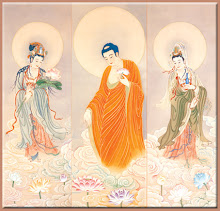 The Philosophy of Change
The Philosophy of ChangeThe Lord Buddha teaches that all conditioned things are always changing, thus impermanent. Both the mind and matter is forever changing, and this proves the insubstantality of life, and the instability of existence.
Realizing this, the beautiful queen of King Bimbisara, Queen Khema avoided seeing the Buddha as she was afarid that the Buddha would criticize her self-conscious awareness of her beauty. As she went to see the Buddha one day, The Buddha created an illusion of a beautiful woman before her, who gradually grew old before her own very eyes and collapses before the Lord. Alarmed and ashamed, Queen Khema realizes the impermanence of the human body.

Unsatisfactoriness of Life.
According to the Lord Buddha, whatever is impermanent is subject to suffering (dukka), and the world rests on this basic factor of suffering. Because of this factor, He goes on to teach us, mankind how to gain our release from this suffering world. (Samsara).
The tragic story of Patacara who loses her entire family in a single dayand a night points out too well how suffering besets the unsuspecting mankind. After listening to The Buddha, she gains peace and calm.

Buddha teaches that all phenomena is non personal
When a thing is impermanent, as all conditioned things are, and thus possible to change, there can be no overlord or Self. Helpless in arranging things according to it wishes there can be no soul as master over mind and body.
The Buddha explains the soullessnes of beings to the five bhikkhus at Isipatana, Benares, in the discourse on soullessness (Anattalakkhana Sutta).
 Freedom of Thought
Freedom of ThoughtAt times, referred to as the Charter of Inquiry, this discourse (Kalama Sutta) to the Brahim Kalamas at Kesaputta.
Preaching against blind belief, the Buddha gave prominence to and encourage the spirit of free enquiry and independance of thought and action , subject to sound judgement 2500 years ago.
He trained his students in the art of questioning as well as the finer points of debate and discussion. Pointing out the dangers of unorganised thinking, the Buddha teaches the Kalamas the art of reasoning for the sole purpose of arriving at true understanding of the Buddha's teaching of the Four Noble Truths.

No comments:
Post a Comment